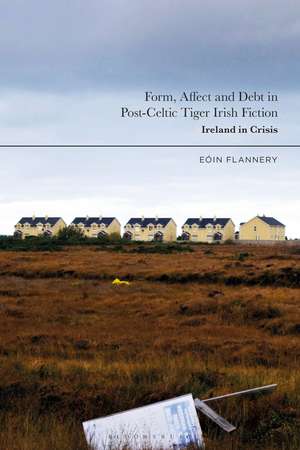Form, Affect and Debt in Post-Celtic Tiger Irish Fiction: Ireland in Crisis
Autor Dr Eoin Flanneryen Limba Engleză Paperback – 29 noi 2023
| Toate formatele și edițiile | Preț | Express |
|---|---|---|
| Paperback (1) | 191.67 lei 6-8 săpt. | |
| Bloomsbury Publishing – 29 noi 2023 | 191.67 lei 6-8 săpt. | |
| Hardback (1) | 540.07 lei 6-8 săpt. | |
| Bloomsbury Publishing – 18 mai 2022 | 540.07 lei 6-8 săpt. |
Preț: 191.67 lei
Preț vechi: 249.53 lei
-23% Nou
Puncte Express: 288
Preț estimativ în valută:
36.68€ • 39.83$ • 30.81£
36.68€ • 39.83$ • 30.81£
Carte tipărită la comandă
Livrare economică 23 aprilie-07 mai
Preluare comenzi: 021 569.72.76
Specificații
ISBN-13: 9781350302204
ISBN-10: 1350302201
Pagini: 256
Dimensiuni: 156 x 234 x 25 mm
Greutate: 0.35 kg
Editura: Bloomsbury Publishing
Colecția Bloomsbury Academic
Locul publicării:London, United Kingdom
ISBN-10: 1350302201
Pagini: 256
Dimensiuni: 156 x 234 x 25 mm
Greutate: 0.35 kg
Editura: Bloomsbury Publishing
Colecția Bloomsbury Academic
Locul publicării:London, United Kingdom
Caracteristici
The first critical intervention in Irish literary studies to engage with the field of economic literary criticism, affect theory in relation to shame and guilt, and the philosophy of debt
Notă biografică
Eóin Flannery lectures in the Department of English Language and Literature at Mary Immaculate College, University of Limerick, Ireland. He is the author of 4 books: Ireland and Ecocriticism: Literature, History, and Environmental Justice (2016); Colum McCann and the Aesthetics of Redemption (2011); Ireland and Postcolonial Studies: Theory, Discourse, Utopia (2009); and Versions of Ireland: Empire, Modernity and Resistance in Irish Culture (2006). His edited publications include: Enemies of Empire: New Perspectives on Literature, History and Imperialism (2007); Ireland in Focus: Film, Photography and Popular Culture (2009), and This Side of Brightness: Essays on the Fiction of Colum McCann (2012).
Cuprins
AcknowledgementsIntroduction1. Celtic Tiger identity parades in Chris Binchy's Open-handed and Peter Cunningham's Capital Sins 2. The Possibilities of Shame in Dermot Bolger's Tanglewood 3. Relative Values in Donal Ryan's The Thing About December and The Spinning Heart 4. Bildung and Temporality in Justin Quinn's Mount Merrion 5. Debt, Guilt and Form in (post-)Celtic Tiger Ireland6. Finance and fiction in Deirdre Madden's Time Present and Time Past 7. Investing in Fictions: Faith, Abstraction and Materiality in Paul Murray's The Mark and the Void BibliographyIndex
Recenzii
Eoin Flannery's Form, Affect and Debt in Post-Celtic Tiger Irish Fiction is a compelling study of the intimate relations between finance and fiction in the wake of the Celtic Tiger. Readers will be truly indebted to this subtle and enlightening study for many years to come. It is pleasingly elegant and playfully entertaining, and it offers a startling account of the tangled co-existence of wealth creation and creative writing.
It is hard not to think that this period in our recent history warrants more attention. And in Form, Affect and Debt in Post-Celtic Tiger Irish Fiction, Eóin Flannery, offers a crucial intervention.This is a work of literary criticism before it is a work of social analysis and Flannery's insights offer readers a renewed appreciation of the works under discussion.
Flannery's consideration of the relationship between form and temporality in post-Celtic Tiger Irish fiction is very strong. He proposes that this implies all too easily an element of historic determinism to Celtic Tiger affluence in the first place, and then to the crash.Flannery's work stands as an important contribution to what he flags as the growing field of 'economic humanities' in Irish studies and contemporary literary studies, providing a rich and detailed reading of twenty-first century Irish fiction, as well as the philosophical and political hinterlands informing it.
Form, Affect and Debt in Post-Celtic Tiger Irish Fiction offers a topical and theoretically astute exploration of the way the novel reflects upon the legacies of the era. [and] the convergence of finance narratives of risk, guilt, and indebtedness with narratives of moral responsibility are incisively explicated by Flannery. Flannery's study exposes the distorted promises and the fractured temporalities of the fictions of the post-Celtic Tiger literary scene. Guilt, shame, confusion are the affects he traces across these texts, transmitted primarily via masculine experiences of disempowerment and doubt.this is, without doubt, an erudite and stimulating intervention in contemporary Irish Studies that will prompt further necessary discussions of the cultural mediations of and reactions to neoliberal capitalism in Irish society.
It is hard not to think that this period in our recent history warrants more attention. And in Form, Affect and Debt in Post-Celtic Tiger Irish Fiction, Eóin Flannery, offers a crucial intervention.This is a work of literary criticism before it is a work of social analysis and Flannery's insights offer readers a renewed appreciation of the works under discussion.
Flannery's consideration of the relationship between form and temporality in post-Celtic Tiger Irish fiction is very strong. He proposes that this implies all too easily an element of historic determinism to Celtic Tiger affluence in the first place, and then to the crash.Flannery's work stands as an important contribution to what he flags as the growing field of 'economic humanities' in Irish studies and contemporary literary studies, providing a rich and detailed reading of twenty-first century Irish fiction, as well as the philosophical and political hinterlands informing it.
Form, Affect and Debt in Post-Celtic Tiger Irish Fiction offers a topical and theoretically astute exploration of the way the novel reflects upon the legacies of the era. [and] the convergence of finance narratives of risk, guilt, and indebtedness with narratives of moral responsibility are incisively explicated by Flannery. Flannery's study exposes the distorted promises and the fractured temporalities of the fictions of the post-Celtic Tiger literary scene. Guilt, shame, confusion are the affects he traces across these texts, transmitted primarily via masculine experiences of disempowerment and doubt.this is, without doubt, an erudite and stimulating intervention in contemporary Irish Studies that will prompt further necessary discussions of the cultural mediations of and reactions to neoliberal capitalism in Irish society.
